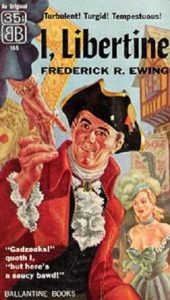Trump supporters on Reddit last week tried, but failed, to keep Hillary Clinton’s new book from reaching No. 1 on Amazon’s bestseller lists. It wasn’t the first time an effort by a group of people affected the book industry. Perhaps the most interesting one, though, involved demand for a book that didn’t exist.
Jean Shepherd had the graveyard slot on New York City’s WOR radio in the early 1950s. Shepherd frequently offered monologues and commentary on his show. A frequent topic was the difference between “night people,” as he dubbed his listeners, and “day people,” who let their lives be governed by rules, lists and schedules. He found what he considered a prime example of day people and their effect on night people in April 1956.
Shepherd went to a noted New York City bookstore looking for a book with the scripts of an old radio show. The clerk told Shepherd that not only didn’t the store have it, the book didn’t exist because it wasn’t on any publisher’s list. Shepherd, though, knew the book existed and the clerk’s insistence to the contrary led to one of the better book hoaxes.
 In telling his audience about his experience, Shepherd suggested they ask bookstores for a book they knew didn’t exist. He and listeners came up with I, Libertine, the first novel in trilogy on 18th century English court life. The imaginary author was Frederick R. Ewing, a retired Royal Navy Commander “well remembered” for a BBC radio series on “Erotica of the 18th Century.” Hundreds of night people responded, asking bookstores and libraries throughout the country for the book. Soon enough, publishers were getting calls from befuddled bookstore clerks and librarians. The nonexistent book was actually banned by the Catholic archdiocese in Boston after a listener who worked for the archdiocese put it on the church’s list of prohibited books as a joke. Once there, evidently no one dared to remove it
In telling his audience about his experience, Shepherd suggested they ask bookstores for a book they knew didn’t exist. He and listeners came up with I, Libertine, the first novel in trilogy on 18th century English court life. The imaginary author was Frederick R. Ewing, a retired Royal Navy Commander “well remembered” for a BBC radio series on “Erotica of the 18th Century.” Hundreds of night people responded, asking bookstores and libraries throughout the country for the book. Soon enough, publishers were getting calls from befuddled bookstore clerks and librarians. The nonexistent book was actually banned by the Catholic archdiocese in Boston after a listener who worked for the archdiocese put it on the church’s list of prohibited books as a joke. Once there, evidently no one dared to remove it
Given the number of inquiries publishers were receiving, Ian Ballantine of Ballantine Books investigated and discovered I, Libertine was hokum. He decided to capitalize on it and actually publish a book by that name. He contacted Shepherd and noted SF writer Theodore Sturgeon. Shepherd outlined the story and Sturgeon wrote the book in 30 days. The cover, of course, listed Frederick R. Ewing as the author and called the book “Turbulent! Turgid! Tempestuous!” Shepherd posed for the author photo on the back cover.
I, Libertine was no longer a hoax come September 20, 1956, when it was published with an initial press run of 130,000 copies. The book lost some momentum before it was published, though. On August 1, 1956, the Wall Street Journal ran a front page story detailing the hoax and Ballantine’s plan to publish a book by that name. The media and others felt they had been played for fools, some saying it all was a tawdry publicity stunt. Others, though, suggest the WSJ article actually helped sales.
Today, print copies of the book on Amazon cost from $65 for a paperback to $125 for a hardcover while prices on AbeBooks go as high as $300. Both Amazon and Barnes & Noble offer I, Libertine as an e-book with Sturgeon as the author.
There’s been some who claim I, Libertine hit bestseller lists. I can find no evidence of that — but there’s little doubt that it sold well — for a hoax.
A barrister needs to know the law; abiding by it is quite another specialty.
“Frederick R. Ewing,” I, Libertine







